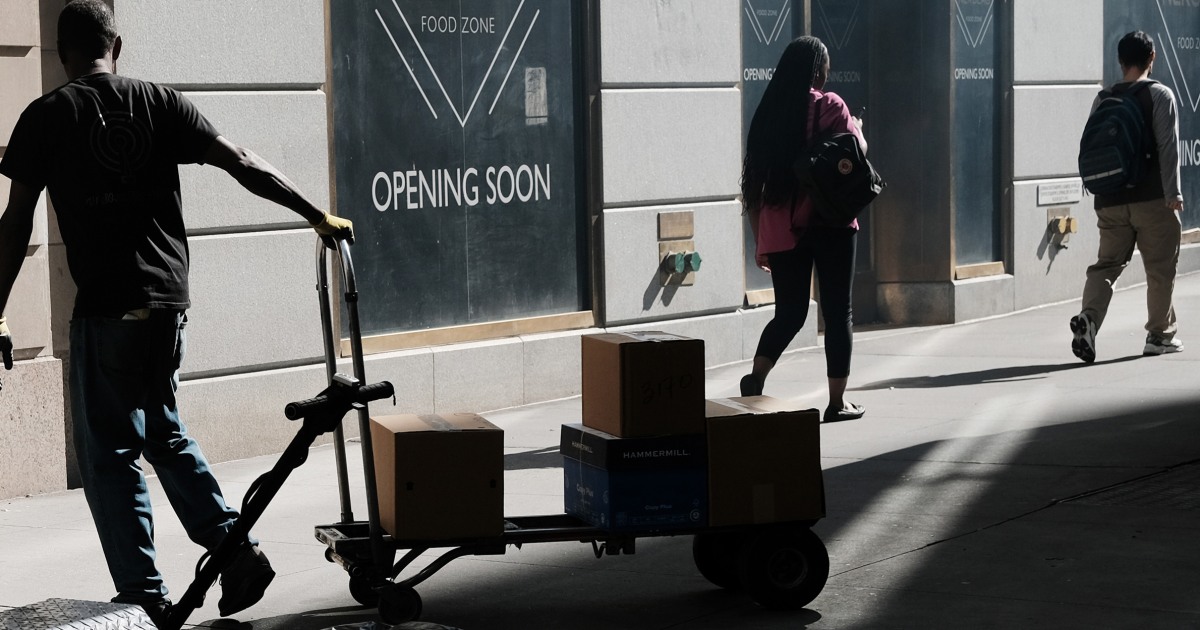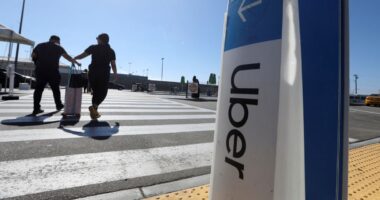
Employees at some of the nation’s biggest companies who lacked sick pay or family leave quit at significantly higher rates than other workers during the pandemic, according to a congressional report released Tuesday — the latest indication of how the absence of social safety net policies in the United States affected the labor force.
The House Select Subcommittee on the Coronavirus Crisis issued the report based on internal data from 12 major firms: AT&T, Berkshire Hathaway, Boeing, Chevron, Cisco, Citigroup, Comcast, ExxonMobil, Oracle, Salesforce, Walmart and The Walt Disney Co. (Comcast owns NBCUniversal, the parent company of NBC News.)
Such internal data is not typically available to investigators and researchers studying workplace equity. The Democratic-led committee selected the companies based on reports that each saw more than 1,000 layoffs during the pandemic. Republicans on the committee did not participate in the report.
Rep. James E. Clyburn of South Carolina, the third-ranking Democrat in the House and the chairman of the subcommittee, said the report underscored the need to enact a universal paid leave program.
“American workers deserve to know that, no matter what crisis they may face, they will not have to choose between keeping their families fed and caring for themselves and their loved ones,” he said in a statement.
Leave and retention
Most of the companies surveyed by the committee said they provided paid sick leave to all workers, but a quarter did not. The report found that workers without paid sick leave quit at three to four times the rate of comparable workers between 2019 and 2021.
Part-time workers fared especially poorly, with 55% having no access to paid sick leave, compared to 14% of full-time workers, according to Department of Labor statistics cited in the report. The report did not break down outcomes by company.
The study found similar outcomes when looking at workers with family and caregiving leave. When workers took advantage of the benefit, they quit at lower rates and saw higher rates of raises and promotions.
The report offers another snapshot of the ways that fault lines of race, sex and class have showed up as inequities in the labor market during the coronavirus crisis. Experts have said that many front-line workers’ lack of robust protections — such as sick pay and stringent Covid-19 safety precautions — contributed to the country’s struggle to contain the virus during the first two years of the pandemic, and to the disproportionate burdens faced by minority and lower-income populations.
The U.S. and South Korea are the only two members of the Organization for Economic Co-operation and Development — a group that represents 38 countries, including most of the top economies in the world — without national paid-leave requirements for workers. About a quarter of workers in the U.S. do not have paid sick leave, a proportion that is higher among lower-wage workers.
Congress created a temporary paid sick-leave requirement for companies with 50 to 500 employees at the beginning of the pandemic, but that mandate expired at the end of 2020. After Democrats won back the White House and the Senate, they pushed to make sick and family leave policies permanent but dropped those provisions from legislation amid contentious negotiations last year.
“Workers that are the most vulnerable overall on the basis of race, or being hourly employees, suffer the most when times get tough, whether we’re talking about the pandemic or anything else,” said Rebecca Givan, an associate professor of labor studies at Rutgers University. “Employers are not doing anything to undo that.”
The hourly divide
The report also underscores a point some labor activists have made since complaints about labor shortages began dominating political discussions in the middle of last year: Low pay and a lack of benefits were factors in the increase in workforce attrition and recruiting challenges during the pandemic.
In the congressional report, salaried workers — who typically enjoy more benefits and stability — fared better than hourly workers within companies. Hourly workers were terminated more frequently and were more likely to quit, the study found.
Among Black workers, for example, hourly employees were terminated at higher rates than their salaried counterparts 75% of the time, while Latino hourly workers were terminated at higher rates than Latino salaried workers 44% of the time.
That divide between salaried and hourly workers highlighted other existing workplace disparities. Female hourly workers experienced worse outcomes than male hourly workers 30% of the time, but among salaried workers, the difference was less than 10%. Women paid by the hour were far less likely to see wage increases, relative to their male counterparts, than were salaried women.
Both Black and Asian hourly workers were less likely to be promoted than their white counterparts, while Black hourly workers were fired at higher rates than white ones.
Aged out
Workers who were 55 or older were 17% more likely to become unemployed during the first six months of the pandemic than younger workers, according to a previous study by AARP, and job loss within that demographic was more often than not involuntary, the report noted. The congressional survey data backed up these early numbers, showing that workers over 50 quit, resigned or retired at lower rates than younger workers between 2019 and 2021.
The subcommittee called for better data from companies and federal agencies on workforce demographics and benefits and said that a universal paid leave program was critical for the country.
“A universal paid sick leave program would be particularly beneficial to hourly workers, who often lack the ability to stay home when sick,” it said. “Ensuring that all American workers have access to these benefits would also enhance the nation’s preparedness for any future health crises.”
Source: | This article originally belongs to Nbcnews.com










